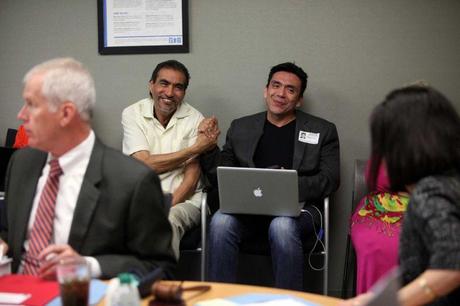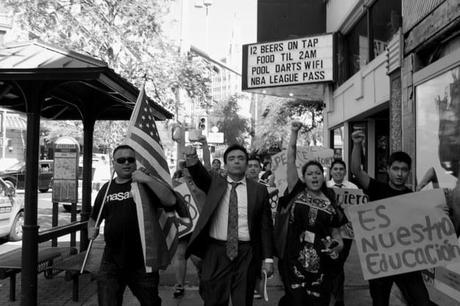
By Alan Bean
Houston Independent School District just voted in favor of teaching Mexican-American Studies in district schools. The vote was unanimous. As the article below indicates, HISD intends to petition the Texas State Board of Education to make Mexican-American studies part of the statewide curriculum.
This suggestion will be strenuously opposed since it flies in the face of recent SBOE precedent. Pat Hardy, a state board member representing parts of Tarrant and Parker Counties, summed up the prevailing attitude when she said,
“We’re not about Hispanic history; we’re about American history,” Hardy said. “We’re not about taking each little group out and saying, ‘You’re the majority, so we’re going to teach your history.’ We’re Americans, United States people.”
Hardy’s “We’re Americans” appeal may reflect the fact that she is facing a strong challenge from a Tea Party candidate, but this perspective has controlled the ideological playing field in the Lone Star State for decades.
But HISD’s groundbreaking decision reveals that change is waiting in the wings. Contra Ms. Hardy, the present curriculum makes it easy for Anglo students to feel that their heritage has been affirmed, but does little to honor the heritage of Latino students. The steady growth of predominantly Anglo private schools, and the rapid growth of the Hispanic population, have changed Texas public education in dramatic fashion. According to a 2012 story in the New York Times,
In 2011, the state reached two landmarks. For the first time, Hispanics became the majority of public school students. And to cope with a historic budget deficit, the Legislature did not finance enrollment growth in the state’s schools — something that had not happened since the modernization of the Texas public school system in 1949. Though the first turning point passed quietly and the second with much political strife, they both underscore the challenges ahead as a dramatic demographic shift occurs in public school classrooms statewide.
The times they are a changin’.
Houston Independent School District Votes To Support Mexican-American Studies
April 3, 2014
Nicolás Medina Mora, BuzzFeed
The district will petition the state Board of Education to make Mexican-American Studies a part of statewide curriculum.The effort will face opposition from conservatives, who have fought to keep “ethnic studies” out of Texas public schools.

Tony Diaz, aka El Librotraficante, with student leaders in San Antonio during the 2014 NACCS Conference protesting Republican-authored SB 1128. Zeke Perez / Via buzzfeed.com
The board of the Houston Independent School District voted unanimously on Thursday to support the creation of a statewide Mexican-American Studies curriculum for Texas public high schools.
“Mexican-American history courses will expose our students to the significant impact that Mexican-Americans have had on the history and culture of Texas,” said HISD Superintendent Terry Grier in a statement. “As a district with such a diverse population, it is our obligation to provide students facts and stories that will help them understand that our country and our state’s history includes people that look like them.”
By itself, the Houston vote does not establish any changes in policy. The final word on whether Mexican-American Studies becomes a subject of study across Texas rests with the state Board of Education, which will next meet on April 8. Still, proponents of the curriculum celebrated the vote as a major victory.
“This is huge, not just for the history that it makes, but for what it means strategically,” said activist Tony Diaz. “This is the largest of Texas’ 1,200 school districts, and its student body is over 60% Latino. They way Houston moves, the rest of the state moves.”
The vote is the latest development in a debate that has for years raged across the Southwest. Conservatives have argued that “ethnic studies” are inherently divisive, emphasizing racial and class divisions rather than easing them. Latino activists hold that Mexican-Americans have played a central role in American history but are nonetheless silenced by traditional curricula. They also say that Latino students deserve to engage with their cultural heritage in the classroom.
